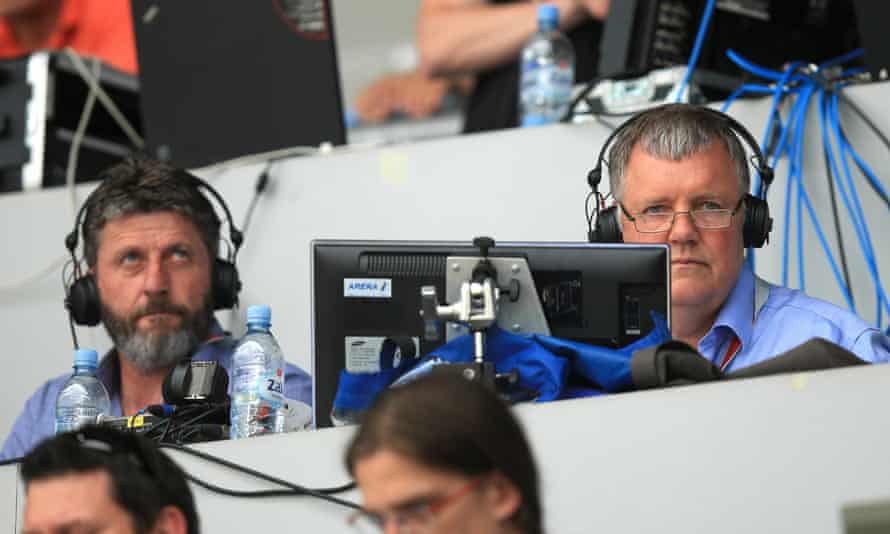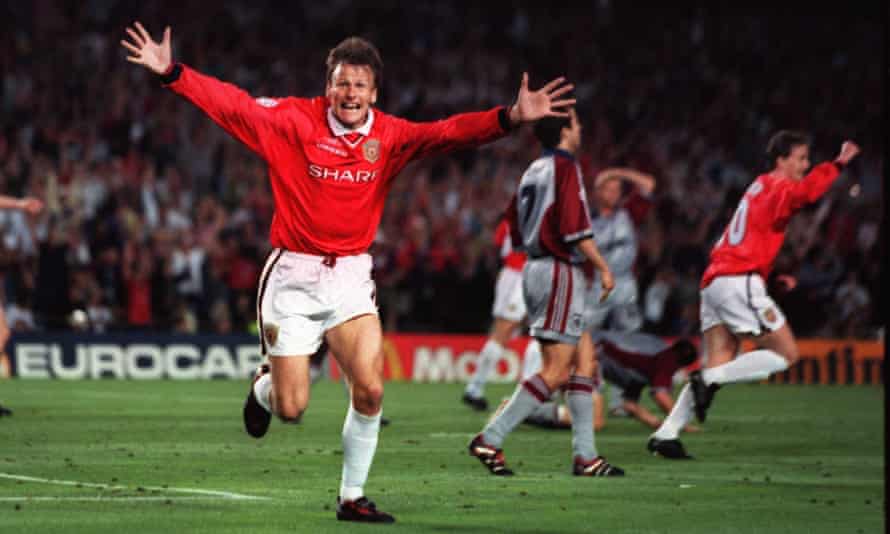“The first thing you’ve got to get your head around as a broadcaster,” Clive Tyldesley says, “is that it’s not actually about you. It’s about the event. I think the greatest quality a commentator can possess in order to connect with a large number of people is warmth. This applies even more so to television presenters as they look into that little coal-black hole and somehow reach you on your sofa, on your commute, sitting in your bedroom with a tablet on your lap, whatever it is, and you want to invest some trust and affection in them.”
Tyldesley, the ITV football commentator who has been working in broadcasting since 1975, is just warming up for an interview that, fittingly, lasts the length of an entire match. “Football commentary is all I ever wanted to do,” Tyldesley explains as passion pours out of him. “I’ve got an illogical dislike of commentators who personalise their work and complain about what they have to watch. They make it sound like a waste of their time. Well, it might be a shit match but the result still really matters to people.
“At the height of the pandemic there was a touching feature on Sky News every night. Instead of just giving the numbers of those that had died they had photographs of people who had passed during the previous two days and it introduced us to these strangers. We often heard that he was an accountant, a good father and a big Luton Town fan. I’d think that supporting Luton can’t have been one of the most important things in this man’s life. But it was – and that brings home to me and fellow football commentators how much the game matters.”
Football matters hugely to Tyldesley. He is consumed by his work and so it is understandable that last July he broke his own rule, briefly, and became the story rather than an observer. “I’m being replaced as ITV’s senior football commentator,” Tyldesley explained in an emotional video he released on social media. “I am upset, annoyed, baffled. I’ve done nothing wrong.”
Tyldesley was shocked that he had been demoted after 22 years in the lead role at ITV. We will eventually explore his disappointment but Tyldesley makes it clear that his pain has eased and he feels reconciled to his new position as ITV’s No 2, behind Sam Matterface. His dedication remains undented and he asked to bring forward this interview by three weeks so he can concentrate fully on his preparation for this summer’s European Championship finals.
We are also here to talk about Tyldesley’s first book. “It’s the one I’ve been wanting to write for 66 years, which is how old I am,” he says. Before any cynics put the boot in and assume Tyldesley is again betraying his own mantra by putting himself in the public eye, it should be said the book is an enjoyable and interesting journey through football over the decades rather than an autobiography.

Our interview took place the day after the hapless attempt to set up the European Super League was announced. Tyldesley was impressively incandescent: “Football cannot be the same, ever again, since 9:30 last night. Even if they backtrack we’ve caught our spouse in bed with another person and the marriage is effectively over. It may continue, but it’s over as we understand it. It is over. These [club owners] are meant to be very smart, successful people. But they’ve totally lost touch with what this sport means.
“A year ago, the consolation we all found in lockdown was an enhanced sense of community and perspective, an appreciation of those who were most vulnerable, those who made the biggest contributions. It was almost uplifting. Somewhere in the midst of that was a genuine belief that football might find a new economy, something more workable and sensible which places new value on its fans. Instead, the biggest clubs are more self-serving than ever. Their answer to cutting their cloth in response to what we’ve all been through has been to try to buy up all the cloth and keep it for themselves.”
Tyldesley’s memories of working with Brian Clough, Bill Shankly and Sir Alex Ferguson are very different, and they enrich his book. One of his first jobs was to cover Nottingham Forest under Clough as a callow reporter for Radio Trent in 1975. “This was the first manager I was transfixed by. He was charismatic, had such aura and presence, gave me some of the greatest interviews I’ve ever had, came to my leaving do, and was charming to my parents because he could turn it on with them like with [Michael] Parkinson. But he was a difficult man to look at, and be around, when I came across him again a little later. He was an ITV World Cup pundit and he was more at the bar.
“In later years, when I heard people telling after-dinner jokes about his drunkenness, I was angry. It was a disease, it was sadness, and it hauled down a man who was great. That’s an overused word in football – but he was a great achiever, a true character and brilliant at what he did. The only contest he couldn’t win was with alcohol.”
Did he also detect sadness in Shankly, who worked alongside Tyldesley as a co-commentator on Merseyside radio after the inspirational former Liverpool manager had been eased out of the club he transformed? “I was too young then to ask those sorts of questions. But I couldn’t get enough of Shanks. I’ve still got tapes of interviews I did with him. When he says my name I kind of shiver.
“I remember a famous European Cup game [at Nottingham Forest’s City Ground in 1978]. Forest had come from nowhere and started taking titles off Liverpool, and they met in the first round of the European Cup. Liverpool were the defending champions and Cloughie gave a debut to a guy the previous Saturday. So that Wednesday night Garry Birtles was making his second senior appearance against Liverpool in the European Cup. Birtles scored in the first half, put them 1-0 up. Shanks was my co-commentator on local radio. So away I go, in typical commentator-ese, and shout into the mic: ‘Garry Birtles, three days ago, we’d never even heard of him!’ Shankly picks up his mic and says live on air: ‘You’ve fucking heard of him now!’ and slams it down on the desk.
“We didn’t receive one phone call of complaint. He was talking for every Liverpool fan that night – from the heart. I actually believe every commentator should be allowed one “fuck” per year because sometimes, whether it’s a great goal or a free-kick that flies over the bar, we should be allowed to go: ‘Fuck!’”
Would Shankly and Clough have been successful managers in any era? “Whether their views of life and football could adapt to the 21st century is a fascinating question. Our best answer lies with Fergie, because he managed Cristiano Ronaldo differently to Ryan Giggs. He got Giggs by knocking on his parents’ door in Swinton. He got Ronaldo by sitting down with [his agent] Jorge Mendes. You have to manage 21st-century footballers differently. Fergie could do that. Could Shankly and Clough? I’m not so sure. Part of their brilliance was their stubbornness.”

Ferguson gave Tyldesley his most memorable commentating experience when Manchester United came back from the dead to score two goals in the last few minutes to win the Champions League final against Bayern Munich in 1999. Tyldesley was under intense pressure that night but he was astute enough to remain totally silent for the first eight of the 108 seconds that separated the astonishing goals that won United the treble.
“The importance of the match for me was that the late, great Brian Moore retired after the World Cup final in 1998. So 1998-99 was my first season as ITV’s senior commentator and if I’d messed up that night in front of 20 million people, they’d have found somebody else. So it’s the most significant few minutes in my career. We wouldn’t be having this conversation if I’d screwed up.
“Reg Gutteridge [ITV’s boxing commentator] gave me a journalistic view of broadcasting. His editorial nous was drilled into me. It was pretty cruel love at times because he was very critical. But I became a great advocate of it and I am to this day. It’s easy to say TV commentators talk too much but Reg said that when you pause it’s not a rest, it’s thinking time. The pause should be in order for the next thing you say to have had some consideration – even if it’s only a few seconds.
“I’ve always believed that the great goals deserve something better than: ‘Amazing, incredible, brilliant.’ If they’re so special, they deserve individual words which capture that moment. So if you can, in those few seconds, somehow editorialise what you see and give it some context for the present and the future, you’ve got a chance of coming up with a commentary line which the moment deserves.
“After I’d shouted ‘Sheringham!’ for the equaliser, I saw Ron Atkinson next to me with the microphone in his hand. I put my arm across him. I didn’t count but I was thinking. The next thing I said [eight seconds later] was slightly strange: ‘Name on the trophy.’ The fact that they did win means I’m reasonably pleased. There was that sense in 1999, and with Liverpool in 2005, that this is written. It was fate, a momentum which defied explanation or analysis. Sir Alex’s wonderful post-match interview summed it up: ‘Football, bloody hell.’ In a way, ‘Name on the trophy’ got the moment. It was much better to have had eight seconds of roaring crowd and simple pictures without me decorating it by screaming.”
The Fiver: sign up and get our daily football email.
Tyldesley admits: “I didn’t see the ITV episode coming. It was a shock when it happened last June. I already had my rota of games for the summer and so part of me felt: ‘Well, if you think I’m capable of doing these games in the summer of 2020, why am I not capable of doing them in the summer of 2021?’ I’m getting old but I’m not in vertical decline. Whilst I was upset, I completely respect my contract was up and it was their right to make a change. What’s made it easier to accept is that I don’t think they’ve just replaced me with a younger person. They’ve replaced me with a different kind of commentator. That is evolution, whether you agree with it or not.
“If they had just brought in somebody who was 40 but sounded like me, I would have had more cause for umbrage. I’m going to be a very happy and conscientious part of ITV’s commentary team at the European Championship and, yes, one of my games is Germany v France. You can’t complain. I just feel very lucky to do the work I have loved so long.”
Clive Tyldesley’s book Not For Me, Clive is published by Headline.
from Football | The Guardian https://ift.tt/2Q9XNGm
via IFTTT

No Comment